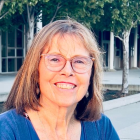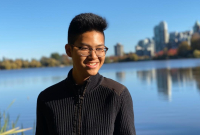As part of a series highlighting the work of young people in addressing the climate crisis, writer Patricia Lane interviews Nicholas Pasieczka, who is part of the United Nations Sustainable Development Goals working group.
Author’s statement
The 1990s were personally tough for me. I spent the decade immersed in action based on climate catastrophe science, trying, and by all accounts failing, to stem the tide. Hardest of all, death and dementia came to my family.
As my awareness deepened about the growing divide between young and old and rich and poor, grief had become a pretty constant companion. I could choose to go further into the abyss of fear and loss or choose the only thing stronger: love. To choose love is to hope. But I had forgotten how. So I made a resolution — one that could last a year or even a decade if need be. I chose to study hope.
Part of my journey is to seek out promising young people who are contending in evidence-based and impactful ways with the climate crisis and engage them in conversations about hope. I am grateful for Canada’s National Observer’s commitment to solutions journalism, which provides these determined, joyful and, yes, hopeful young people a voice.
Nicholas Pasieczka
On April 27, 2019, Nicholas Pasieczka ran 100 kilometres in one day to raise money for a renewable energy charity that empowers women. Now 20, he is a founder of the University of Manitoba’s faculty of engineering sustainability committee. He created a biking video to promote sustainable transportation in Winnipeg and is part of the United Nations Sustainable Development Goals working group. He was also named one of Starfish Canada’s Top 25 Environmentalists under 25 in 2020.

Were you always interested in sustainability work?
No. I got my pilot’s licence with the Air Cadets and I wanted to be in the aerospace industry. On an exchange trip to France, someone asked what I intended to do with my life. I realized aerospace was not it. I wanted to work directly on solving problems for millions of people. The switch was a bit scary, to be honest, so when I got to university, I looked for student groups that might help me learn more.
How did that lead you to run 100 kilometres in one day? How does one even do that?
The University of Manitoba Efficiency and Renewable Technology Hub (UMEARTH), opened my eyes to the reality of life in the global south. Many people walk hundreds of kilometres every week to collect wood for fires, which is a waste of time and causes deforestation. Or they burn kerosene, which is an expensive, unhealthy fossil fuel.

If these people could walk so far every week, the least I could do was use my athletic ability to run for one day. Like all journeys, it began with a single step. I started running 30 kilometres a day, and since the Prairies are flat, before long, I was ready. My funders helped finance 51 solar-powered lights and trained and empowered 20 women.
What else did you learn from that experience?
UMEARTH was doing a design/build of a solar cooker. I started learning about solar technologies and became a qualified solar panel trainee, but I wanted to do more. I decided to raise money to help. I chose an NGO, the Pollinate Group which lends money to women in the slums of India and Nepal to purchase solar-powered lights. This trains and empowers female entrepreneurs, provides light so students can study at night, which decreases inequality, and replaces unhealthy kerosene and wood burning.
What are you focused on now?
I helped organize a design challenge where 60 of our participants brainstormed solutions to global challenges like forest fires and micro-plastics. I am now part of a student group helping to get our communities involved in working to meet the United Nations Sustainable Development Goals.
I have come to believe decision-makers must have more confidence in policies to decrease global warming. In the 2020 Manitoba Youth Parliament, I introduced a bill to legislate higher levels of building insulation. Future parliamentarians learned that while we have the technology we need, we must also have political will to implement solutions. I plan to work in renewable energy and take what I learn into policy (making) and political decision making.

Tell us about your background.
I come from a long line of farmers just outside Winnipeg in rural Manitoba. Farmers help each other. Community is how you make it through. My Dido (grandfather in Ukrainian) built the largest cross in Western Canada. It is 30.5 metres high. That might not be something I would do, but I learned the lesson — if you are going to do something, do it well.
Air Cadets taught me discipline, leadership, and that if I work hard, I can reach the sky.
What motivated you to change your career to serve others?
Volunteering with Air Cadets showed me how much reward there is in service. So many people don't have their basic needs met, and I find great satisfaction when I serve others.
What advice do you have for other young people?
On a plane when a mask drops down, you cover your own face first. In the same way, pray, meditate, exercise and eat well so that you can be there for other people.
COVID-19 is taking a mental health toll. Huge problems like mental health and climate change can be scary. In my long run, I didn’t think about the 100 kilometres ahead. I thought about the next step. If I’d thought about the whole run, I might not have made it. But I certainly wouldn’t have met my goal without taking each step.
Ask for help. Look for inspiration.

Do you have anything to say to older people?
Thank you. Your help is needed. We have a lot of passion, but it can be misdirected. Ask our opinions. Your interest can open the door to more respect, and therefore, more engagement.
You are busy. Why did you want to spend this time with me?
I believe in self-fulfilling prophecies. The story now is that climate change is a disaster. But I see so much opportunity for us to come together as a world with clean air and water and food, medicine and energy for everyone. We are all needed. Maybe someone who is a bit discouraged will read this a year from now and it will help.






Comments